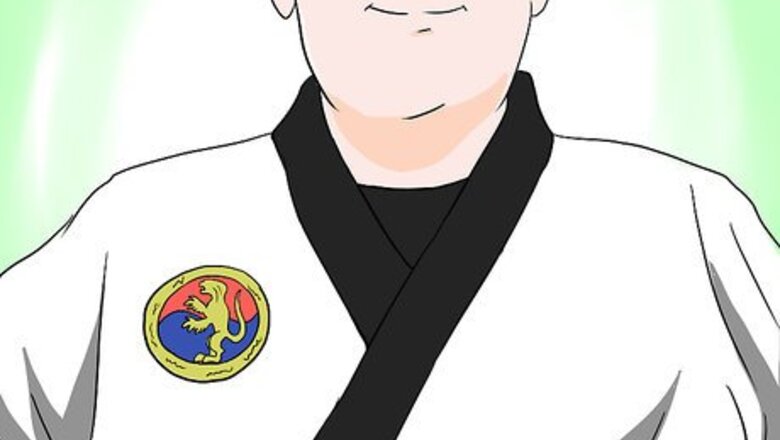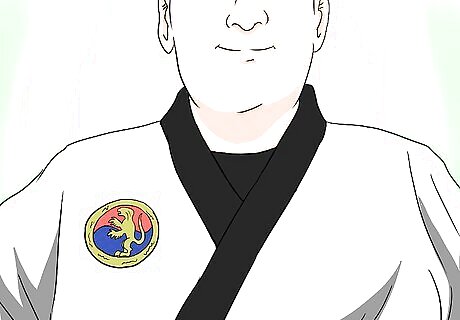
views
X
Research source
How do you spot the red flags and avoid a school that teaches you a watered down version of a martial art? Or find a school that gives you (or your children) belts based on ability, rather than ability to pay? This article will focus on warning signs that are specific to Taekwondo.
Look for discrepancies between the art and the school. A complete Taekwondo curriculum includes: philosophy, meditation, basics, forms, self-defense, sparring, breaking, stretching, leadership skills and fitness. A school that doesn't strictly adhere to this curriculum, or to Korean traditions and standards in general, may still be a good school. But, the further it strays from tradition, the more careful you need to be in judging the school. At the very least, inquire as to why these discrepancies exist, and expect an answer that checks out. Taekwondo is a Korean martial art. In Taekwondo there are weapons such as staffs, kamas, nunchuck, etc. Many Taekwondo schools add weapons training as a way to supplement a curriculum.Choose a Taekwondo School Step 1Bullet1.jpg Traditional Taekwondo uses a white uniform called a dobok. The white uniform symbolizes purity and perfection of character that Taekwondo students are expected to strive for. It is common for schools that do not understand the philosophy or history of Taekwondo to utilize lots colorful uniforms, stripes and patches.Choose a Taekwondo School Step 1Bullet2.jpg Taekwondo teaches self-defense. Physical fitness is a pre-requisite for self-defense. Limited contact sparring is also an essential step to learning adequate self-defense skills. Beware Taekwondo schools that do not practice sparring, use only non-contact sparring or avoid competitions altogether. Competition, not isolation, breeds excellence.Choose a Taekwondo School Step 1Bullet3.jpg Taekwondo is distinctly and proudly Korean. In Korean a Taekwondo school is called a "Dojang" and sometimes "Kwan". The Korean terms for instructor "Sabonim" and "Kwan Jang" for the person in charge of the school. Beware Taekwondo schools that use the Japanese or Chinese terms such as "Dojo", "Professor", "Sifu" or "Sensei".Choose a Taekwondo School Step 1Bullet4.jpg Taekwondo is a martial art, not a sport! Taekwondo sparring is an Olympic sport; however, sparring is only one aspect of a complete Taekwondo curriculum. A school that focuses only on sparring is incomplete just as a school that does not include sparring is incomplete. The main training consists of: Sparring, workouts, stretching and playing educative games.Choose a Taekwondo School Step 1Bullet5.jpg

Research the instructor. For WTF Taekwondo: The South Korean government recognizes the Kukkiwon in Seoul Korea as the World Taekwondo Federation Headquarters. The Kukkiwon issues international black belt certification, instructor certification, publishes the Kukkiwon textbook, sets the standards for techniques and forms and holds an international tournament each year called the Hanmadang. Many unqualified WTF instructors do not even know what the Kukkiwon is. A WTF instructor who is not certified by the Kukkiwon may still be qualified, but they should at least be familiar with the Kukkiwon; their qualifications can be judged by the remainder of the steps below...Choose a Taekwondo School Step 2Bullet1.jpg For ITF Taekwon-Do: Does the instructor claim to 'do ITF Taekwon-Do' yet is not qualified by the ITF. The ITF has split into 3 factions, however anyone teaching ITF Taekwon-do should be recognised by at least one of them. The ITF set the technical standards and approve gradings.Choose a Taekwondo School Step 2Bullet2.jpg How long has the instructor been practicing? What is the instructor's rank? For WTF Taekwondo, the Kukkiwon recognizes 4th degree black belt as the minimum rank required for instructors. This usually takes a minimum of 12 years of training.Choose a Taekwondo School Step 2Bullet3.jpg Find the instructor's certification and research the organization that issued the certification. Call and verify the certification.Choose a Taekwondo School Step 2Bullet4.jpg Get professional references and verify them. Other reputable instructors that can vouch for the instructor is a start. Professional associations are another place to check.Choose a Taekwondo School Step 2Bullet5.jpg Do a criminal background check. This is important! A lot of people that have martial arts background but fail to legitimately make it in the business world will turn to martial arts as a career because it is not regulated by the government. It is relatively easy to fool the uneducated public about martial arts qualifications. Would you trust this person with your child/wife/husband? Some instructors abuse their position of authority and trust by treating children and women inappropriately. Remember that instructors aren't regulated, so it is up to you to decide whether this is someone you trust your loved ones with.Choose a Taekwondo School Step 2Bullet6.jpg A real master is someone with an unusual level of skill that is usually accompanied by an unusual level of humility and dedication to serving others. In ITF Taekwondo the rank of master is given to 7th and 8th Dans, and the title of Grandmaster is given to 9th Dans. Beware of anyone claiming to do ITF Taekwondo and claiming to be a 10th Dan as no such grade exists in the ITF.Choose a Taekwondo School Step 2Bullet7.jpg See if the instructor has a Facebook or other social network profile. Beware the instructor who has filled this with foul language, insults of other martial artists and other examples of lack of respect.Choose a Taekwondo School Step 2Bullet8.jpg
Research the students. Always watch a class at the school you are considering before joining. If possible, watch a promotion test / grading. A good school has nothing to hide and will allow spectators. Are the students happy? Disciplined? Competent? Physically fit? Well groomed? Well spoken? Taekwondo is about discipline...a good Taekwondo school should have very well behaved students that speak politely, treating others with a level of respect sadly lacking in today's society. Watch other area martial arts classes and watch videos on YouTube. How do these students compare?Choose a Taekwondo School Step 3Bullet1.jpg Find out how many black belts the school has and how long it has been going. Large numbers of black belts, especially very young ones usually means very low standards, unregulated by genuine associations.Choose a Taekwondo School Step 3Bullet2.jpg A good school is clean and solemn. There should be sense of dignity while class is conducted. The students and the spectators should be well behaved. Teachers should not tolerate rowdy behavior. Choose a Taekwondo School Step 3Bullet3.jpg Beware schools that look like day cares. If it looks and smells like a day care go elsewhere. Undisciplined children running about is a big warning sign.Choose a Taekwondo School Step 3Bullet4.jpg Beware the instructor who is clearly unfit / overweight and does not join in anything physical him / herself. The instructors should be able to demonstrate anything that they teach you.Choose a Taekwondo School Step 3Bullet5.jpg Ask the instructor to show you the practical applications of the techniques you are being taught. If they don't work then find another instructor who can show you how to do them so that they work.Choose a Taekwondo School Step 3Bullet6.jpg

Study the costs. Some schools place more emphasis on profits than on discipline and skill. Sometimes there are associated fees that you won't find out about unless you ask: belt test, association membership, and long-term contracts. It's not unusual for the school to ask for an annual contract (especially since most people quit within 6 months) but some schools will say that you can break the contract if you want, then when the time comes, they are uncooperative; and some schools have a “bait and switch” program in which they let you pay on a monthly basis for a certain amount of time, then require that you sign a long-term (2-4 year) contract in order to advance in rank. A good school should never have to resort to these tactics in order to gain students.




















Comments
0 comment